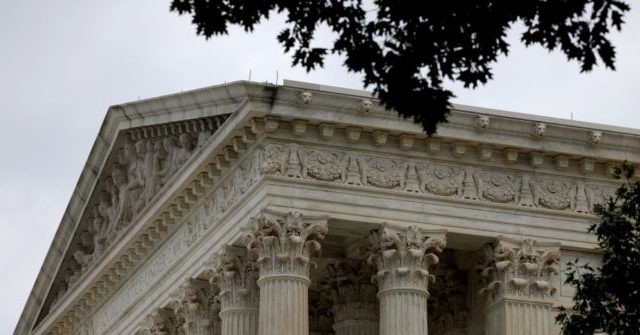
The Supreme Court ruled 8-1 Wednesday in favor of a high school cheerleader at Mahanoy Area High School in Mahanoy City, Pennsylvania, who was kicked off the school’s cheerleading group after calling out the school with blasphemies on Snapchat for supposedly telling her she needed to spend a year on the junior university (JV) group before making it to university– while an incoming freshman trainee made it on the varsity group, skipping JV.
Justice Stephen Breyer delivered the viewpoint of the Court, with Justice Clarence Thomas providing the dissenting opinion.
“A public high school trainee [B.L.] utilized, and transferred to her Snapchat friends, vulgar language and gestures slamming both the school and the school’s cheerleading group,” the Court viewpoint reads. “The trainee’s speech happened beyond school hours and far from the school’s campus. In action, the school suspended the trainee for a year from the cheerleading group.”
Justice Breyer goes on to state, “We have actually explained that students do not shed their civil liberties to liberty of speech or expression, even at the school house gate. However we have likewise explained that courts must use the First Modification ‘due to the special characteristics of the school environment.'”
“One such characteristic, which we have actually worried, is the truth that schools at times stand in loco parentis, i.e., in the location of moms and dads,” the viewpoint included.
Therefore, the eight justices chose the school’s transfer to punish the cheerleader was in offense of the First Amendment, because it breaches the Tinker rule.
Tinker v. Des Moines Independent Neighborhood School Districtstates public school officials may regulate speech that would materially and substantially interfere with the work and discipline of the school.
“Putting aside the repulsive language, the listener would hear criticism, of the team, the team’s coaches, and the school– in a word or 2, criticism of the rules of a community of which B.L. forms a part,” Justice Breyer wrote. “This criticism did not involve features that would position it outside the First Amendment’s normal security.”
“Her posts appeared outside of school hours from an area outside the school,” the Court viewpoint continued. “She did not recognize the school in her posts or target any member of the school community with vulgar or abusive language.”
“B.L. likewise transmitted her speech through an individual cellular phone, to an audience including her personal circle of Snapchat buddies. These features of her speech, while running the risk of transmission to the school itself, nevertheless … reduce the school’s interest in penalizing B.L.’s utterance,” Breyer included.
“It might be appealing to dismiss B.L.’s words as not worthy of the robust First Amendment securities gone over herein,” the Court viewpoint stated. “But in some cases it is needed to protect the superfluous in order to protect the required.”
Justice Samuel Alito added in a concurring viewpoint signed up with by Justice Neil Gorsuch that “while the decision to register a student in a public school might be considered conferring the authority to control some off-premises speech– enrollment can not be dealt with as a complete transfer of adult authority over a student’s speech.”
“In our society, parents, not the State, have the main authority and task to raise, educate, and form the character of their children,” Alito added.
Justice Alito continued:
The overwhelming bulk of school administrators, teachers, and coaches are males and females who are deeply committed to the very best interests of their trainees, however it is predictable that there will be celebrations when some will get carried away, as did the school officials in the case at hand. If today’s choice teaches any lesson, it should be that the policy of lots of types of off-premises student speech raises severe First Amendment issues, and school authorities must proceed cautiously prior to venturing into this area.
Justice Thomas, nevertheless, dissented from the Court’s conclusion, asserting that, traditionally, such discipline was not considered a free speech offense.
“A more searching evaluation reveals that schools historically might discipline students in circumstances like those provided here,” Thomas wrote. “Because the bulk does not attempt to describe why we need to not use this historic guideline and does not try to tether its technique to anything stable, I respectfully dissent.”
Justice Thomas included:
The Court bypasses that decision– without even pointing out the 150 years of history supporting the coach. Utilizing broad brushstrokes, the majority lays out the scope of school authority. When trainees are on school, the bulk states, schools have authority in loco parentis– that is, as substitutes of parents– to discipline speech and conduct. Off campus, the authority of schools is rather less. At that level of generality, I concur. However the majority leaves out crucial information. What authority does a school have when it runs in loco parentis!.?.!? How much less authority do schools have more than off-campus speech and perform? And how does a court decide if speech is on or off school?
“The Court transparently takes a common-law approach to today’s choice,” Thomas discusses. “In result, it specifies simply one rule: Schools can control speech less typically when that speech occurs off campus. It then determines this case as an example and leaves for future cases the task of establishing this brand-new common-law teaching.”
“But the Court’s foundation is untethered from anything stable, and courts (and schools) will almost certainly be at a loss as to just what the Court’s viewpoint today means,” Justice Thomas included.
“Perhaps there are excellent constitutional reasons to leave from the historical rule, and maybe this Court and lower courts will identify and explain these factors in the future,” Thomas composed. “But since the Court does refrain from doing so today, and since it reaches the incorrect result under the appropriate historical test, I respectfully dissent.”
The case is Mahanoy Area School District v. B.L., No. 20-255 in the Supreme Court of the United States.
You can follow Alana Mastrangelo on Facebook and Twitter at @ARmastrangelo, and on Instagram.

